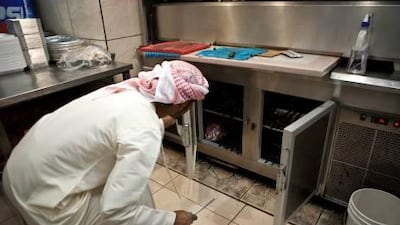ABU DHABI // Almost all of the emirate's restaurant and kitchen staff are now trained to handle food safely, the food regulator says.
A training programme that started in 2008 has reached 90 per cent of staff in Abu Dhabi's food outlets, the Abu Dhabi Food Control Authority (ADFCA) said yesterday.
A total of 58,385 staff have had at least six hours of hygiene training and sat a 45-minute test.
Until 2008, 60 per cent of staff at food establishments were required to have taken the training and were not required to pass the final exam.
But for the past three years, all staff have been required to take the training and pass the test - or their restaurant would not have its licence renewed each year.
The authority hopes to cover all food handlers in Abu Dhabi by 2013. The pass rate has reached 62 per cent, up from 37 per cent three years ago.
In the programme's first year, only 10,800 food handlers had participated. In its second year, that number almost doubled to 20,900, but three in five failed the test.
In the past year, 26,685 workers underwent training.
Saeed Jasim Mohamed, the acting director of communications for the ADFCA, said the high rate was due to a redesigned test intended to compensate for many food handlers' low literacy and frequent lack of either English or Arabic.
"The multilingual composition of food handlers in Abu Dhabi presented a rather difficult challenge," said Mr Mohamed.
About 80 per cent of food outlet staff do not speak Arabic or English. Indians made up 66 per cent, other Asians 19 per cent and Arabs 11 per cent.
But the authority has now produced pictorial exams designed by psychologists to alleviate the burden of illiteracy.
The test is a great idea, says Sven Mostegl, a food consulatnt.
"This will definitely help in achieving results," said Mr Mostegl.
Exams were originally given in Arabic, English, Hindi and Urdu. Malayalam and Bengali have been added, and the training is now available in Tamil.
Those who do not pass on their first attempt will be allowed to resit.
Staff who fail a second time will be sent on a more rigorous food-safety course. Once they pass, workers will be issued with a certificate valid for five years.
The authority also wants to improve food handlers' practical skills - how to cook, clean, chill and avoid cross-contamination through good personal hygiene.
Staff are taught about preparation, processing, packaging, storage, transport, distribution, selling and service.
"The focus is on microbiological hazards, as they are of the most important to public health," said Mr Mohamed.
These include disease-causing bacteria, viruses and parasites, many of which occur naturally in the environment and can be food-borne, water-borne, or transmitted from a person or an animal.
Cooking kills or renders most pathogens harmless, while proper cooling and storage can control them before or after cooking.
"Hypermarkets in Abu Dhabi are very good with food safety but small shops - absolutely not," said Mr Mostegl. "Some shops still need improvement."
But he agreed that Abu Dhabi had conducted more stringent controls, inspections and training in the past two years.
"They've made amazing progress compared to how the situation was before," Mr Mostegl said.
"Abu Dhabi will be able to catch up with Dubai and I believe all emirates in the next couple of years will fall under one hygiene regulation or law."

